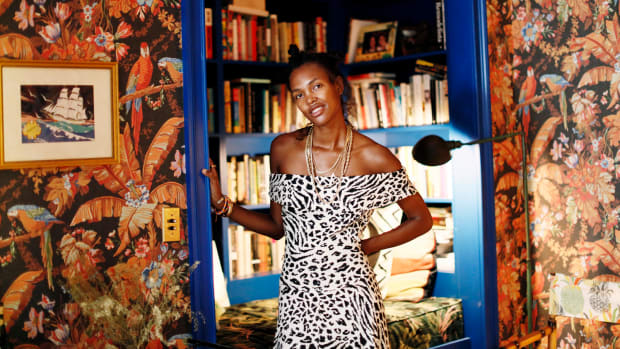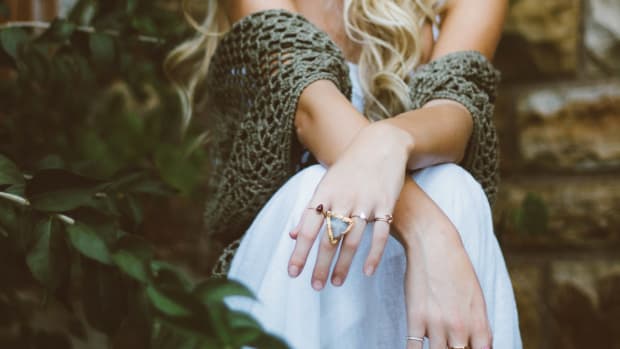Megan O'Neill and I, as they say, go way back. We both roamed the halls of 4 Times Square in Lucky's glory days, she as a glamorous, assured associate beauty editor
and me as a harried cog in the digital-content-farm wheel. With each issue, O'Neill's prose would motivate me to bleach my hair (which, for the record, I never did) or shop for beauty products at the health-food store (which I did — and still do). After Lucky went south, O'Neill and I parted ways, too, with her landing at Elle and later Goop, where she's been ever since.
A New York City native, O'Neill has never been one for beauty products in the traditional sense. She just wanted to write for a magazine, period, and her "in" came by way of an informational interview with Lucky's longtime beauty director Jean Godfrey-June, who joined Goop in 2015 and eventually brought O'Neill on board. The two hit it off, and not over their love of, say, makeup (O'Neill doesn't wear it), but the way beauty and wellness can make you feel.
"I like beauty now because there's a mood that beauty products give you," she shares. "For me, it's more about the emotional response and the memories it conjures."
Today, O'Neill brings that philosophy to the readers (and for those who tuned into Netflix's "The Goop Lab," viewers) at Goop, where she relishes in science-backed reporting fit for anyone and everyone to consume. ("I love how we talk to PhDs and psychologists and neuroscientists," she says. "Having access to those brains is just so cool.") One such brain: the mystical Wim Hof, who coached her through his signature breathing exercises on an episode of "The Goop Lab."
Ahead, O'Neill walks us through her career trajectory — from television production assistant to the padawan to Wim Hof's Jedi — and discusses how the historically problematic beauty and wellness industry can change to better reflect the world we live in. Read on for the highlights.
Tell me about the origins of your interest in beauty, before you pursued it as a career.
Well, it's funny because I didn't really have an interest in beauty. Like, at all. I just wanted to be a writer, and specifically at a magazine. When I was growing up, magazines were the thing. My dream was to write at a magazine and to deal in some way with pop culture. I've always been obsessed with pop culture. And not just pop culture, but "It" girls — what they're wearing, a nail polish they love.
So I went to college for writing and when I graduated, I moved back to Manhattan, where I'm from, and had a series of terrible jobs. I was a production assistant for an A&E show about U.S. Marshals. I shouldn't say it was terrible — I was so grateful to have a job, and it allowed me to pay my rent, but it just wasn't what I wanted to do.
Enter your first magazine gig as an associate beauty editor at Lucky, where you worked with both Brandon Holley and Eva Chen before the publication folded. How did that role present itself?
My mom works with The New Yorker. She's a copy editor and has been for like, 30 years. So she knew someone at The New Yorker who was friends with Jean Godfrey-June, who's this legendary figure in the beauty industry, and that was my in, how I got to a foot in the door to even talk to anyone.
I went in for an informational interview with Jean, and I was like, "This woman's great." I didn't care about beauty, but I made up this whole tale about how and why I love beauty products. I didn't get to it until the end, and right before I was going to launch into it, Jean was like, "I'm so happy you're not one of those people who came in here raving about how much you love beauty products." It was so fortuitous that we were similar in that respect.
So anyway, I went in for the informational interview and I followed up for literally five years. Once a year, I'd check in with her and she'd never have any openings. And then, the fifth year, she had an opening. So I went in for an interview and got the job of associate beauty editor.
Tell me a bit about that experience — what lessons did you learn in your time at Lucky that you still carry with you today?
Oh, God. So much. I took away that the best way to learn is to just soak in the room, which we do lose now working remotely. To be able to watch people and see how they interact, how they handle conflicts or collaborations… That's so invaluable in figuring out what you want your work persona to be. It was a masterclass in being a working person and a thinking person. Lucky was so fun, too. It was awesome to be around all these women who were dressed fantastically, and were so smart and so opinionated. It showed you the many different faces of what being a boss and a leader could look like.
You then moved over to Elle. Coming from Lucky, what was that experience like?
Elle was amazing in a totally different way. Elle ran longer pieces. Lucky was sort of blurby, and that's its own genius, to be able to pack all that information into a blurb and make it meaningful. It's honestly a skill.
The beauty director at the time, Emily Dougherty — who's the best, and a brilliant woman — was super science-oriented. We talked a lot about research and studies in the sense that we're still talking about lipsticks, but we're also highlighting the chemistry of the formula and what went into creating it. It made me dig a little deeper, and it was an invaluable writing lesson.
Recommended Articles
How did the Goop opportunity come about?
I love Goop so much. I got to Goop because Jean went there after Lucky, and when I was over at Elle, Goop was growing and she was able to hire more people on her team, so I came to Goop as the senior beauty editor. I remember when I was leaving Elle, I was like, "I don't know if I want to leave magazines and work for the internet." [Laughs] But I'm glad I did.
I feel really honest working here. I'm so obsessed with everything we talk about, whether it's orgasms or vibrators or 'clean beauty' or how there's often 'hormone disruptors' in conventional beauty. I mean, we just talk about everything. What dreams mean and how to decode them. Literally everything, we talk about at Goop. Why Black lives matter, how to be anti-racist. I mean, that's true pop culture, right? I've always been chasing pop culture, and this is truly what it means, through and through. There's wellness, there's beauty, there's food, there's everything a person thinks about. And I just love that.
Speaking of wellness, the industry has experienced a reckoning in recent years, with many shining light on its embrace of exclusivity, privilege and white supremacy. What does wellness mean to you, and where do you see the sector going from here?
Wellness has gotten flack for not being inclusive in the sense that to achieve this concept of wellness, you have to have money to buy the organic thing or the $180 face oil. But the thing I love about Goop is that we talk about wellness nonstop. The content is free. Obviously, we sell luxurious, clean skin care that's not free, but all the content is free. And wellness is that. It's being able to inform yourself by learning from a legitimate source.
It's informing yourself on how to take care of yourself to feel good and healthy and flexible, and to feel like you can evolve and take criticism. It's knowing how to eat. It's knowing how to get in the right headspace to last against all the problems and hard things that are happening on this earth on a daily basis. I don't want to say wellness means being healthy and happy. It means being in control of your own mental and physical health. And I like that there are accessible resources to do that right now, and I think Goop is a really excellent resource.
If you were to go through the highlight reel of your career thus far, what would be the big moments that stand out to you?
I felt really lucky to be able to write "What's a White Black Girl?" and share it on Goop. I had something to say that I thought was important, and I got a space to broadcast it and reach people I might not be able to on my own. It felt good to say something.
It was pretty awesome being on the first season of "The Goop Lab" with a bunch of my colleagues. For one of the episodes, we all flew to Lake Tahoe with Wim Hof. It was the most epic weekend. I never have trouble falling asleep, but I remember after we swam in frigid Lake Tahoe, I was just so amped. I was just up all night bouncing off the walls.
Basically, his whole thing is that you're the steward of your own health and your own breath, and breath is everything. He does a breathing technique, and the idea is to alkalize your body so you're not as susceptible to cold. I'm the most frigid person on earth. I live for nasty, sticky Manhattan summers. It's the only time I'm comfortable in my skin. I'm always cold. I hate AC. I haven't had it in my house my whole life. But he led us in a whole yoga class in the snow, in bathing suits, and I wasn't even cold. The grand finale was doing the breathing and then jumping into Lake Tahoe. It was just the most epic, insane experience.
What role have mentors like Jean played throughout your career?
Well, I mean, Jean is my mentor and at this point, my friend. She's so passionate and smart and on the cutting edge of things, and always wanting to make whatever we're working on great. That boosts me constantly, to see and to work under someone like that. It's inspiring to wake up and want to make the best thing we can. Sometimes you don't feel like doing that. Sometimes you wake up and you're over things, but she's so engaged that it makes me engaged, too.
What's something that excites you about the beauty industry right now?
Just the idea of how personal health is. What we each need is so different, and if we know how to feed ourselves and if we can be more attuned to our own bodies to feel when something's off… I love that idea. I'm not some guru, but I make an effort to have moments of stillness to check in with myself. When you do have a little more stillness, you can feel things going on, emotionally and physically. That's a long way of saying that I love being able to have more control over my health, to know that it's up to me ultimately, and no one knows how I'm feeling better than me.
And just to be clear, I love doctors. I love science. I love Western medicine. I love vaccines. Still go to the doctor, still take medicine, still get vaccines — but you can do other things alongside that to feel like your best self ever.
This interview has been edited and condensed for clarity.
Never miss the latest fashion industry news. Sign up for the Fashionista daily newsletter.



